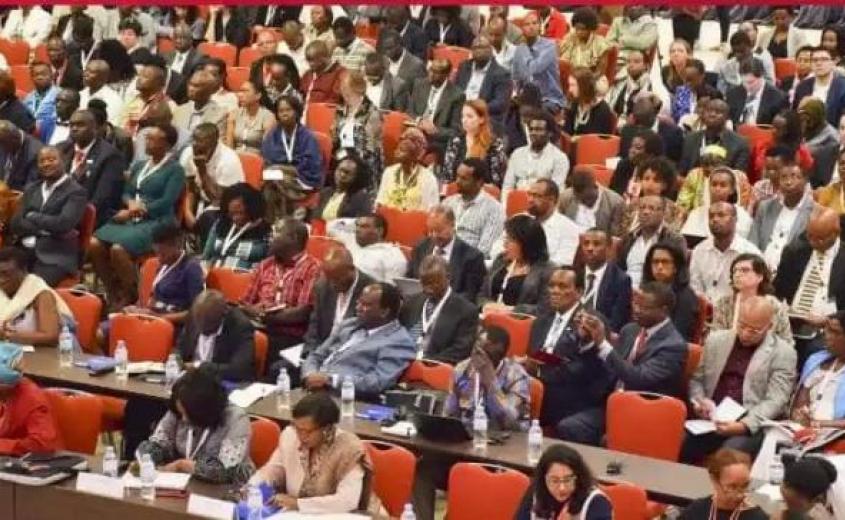African leaders deliberates on Climate Change as a social determinant of health

Kigali, Rwanda- Sabin Nsanzimana, Rwanda’s Health Minister is hopeful that Africa will use scientific evidence to address its vulnerability to climate effects and the deteriorating public health caused by extreme weather events, food insecurity, poor access to clean water, and frequent epidemics.
“African nations remain vulnerable to the effects of climate change. We are already feeling the effects of deteriorating global health through extreme weather events and food insecurity, limited access to clean water, and frequent epidemics. Yet these issues remain on the periphery of climate conversations despite the existence of scientific evidence that climate change threatens our well-being,”
Making the remarks ahead of the 5th Africa Health Agenda International Conference (AHAIC) 2023 www.AHAIC.org on the theme Resilient Health Systems for Africa: Re-envisioning the Future Now, she said, the best course of action is to investigate practical solutions that can be contextualized to address our own issue.
Experts say, the 1.2 billion youthful population of Africa is already enduring climate change, hence the need to advocate for more resources to resolve the global health and climate crises as the world slowly emerges from the three-year grip of the COVID-19 pandemic.
Slated for March 5-8 2023, the AHAIC aims to shape a joint African position on climate and health ahead of critical conversations at the World Health Assembly http://bit.ly/3li1xF6, the 78th session of the United Nations General Assembly (UNGA 78) https://bit.ly/3HyMrlO, and the 28th session of the Conference of Parties (COP 28) https://bit.ly/3XdM6eh later this year.
Ahmed Ogwell Ouma, Acting Director General, Africa CDC says Africa must know what it cannot survive and prepare for it together even as we await the world’s ability to prevent the next pandemic. “While we remain cautiously optimistic about the world’s ability to prevent and withstand the next global pandemic, we must also be cognizant that we cannot survive what we do not prepare for. It is, therefore, imperative that we come together to find solutions to today’s and tomorrow’s challenges while we still have the opportunity.”
Together with member states and partners like Amref, the Africa CDC will continue to implement the new public health order to drive Africa’s health security, he added
AHAIC 2023 comes at the backdrop of calls by African leaders for a more urgent action against climate change as its effects on the continent. At the heart of the conference, sustainable and inclusive solutions to Africa’s most pressing climate change and health challenges will be finalized.
Githinji Gitahi, Group CEO, Amref Health Africa believed for the first time, Africa will discuss the impact of climate change on health.
“This will be the first time that a global health conference in Africa focuses on climate change as a key determinant of health. We know that climate change and health are intrinsically intertwined, yet they have for decades now been treated as two separate issues,”
“At AHAIC 2023, we will explore themes at the nexus of climate change and health, including a rapidly warming planet, pandemic preparedness, food security and nutrition, innovation, research and development, gender, and conflict, Githinji explained .
As the world nears the deadline of the 2030 Sustainable Development Goals (https://bit.ly/40zcTEI) African leaders at the conference will urge the global community to renew its commitments to end poverty and improve health and wellbeing and as well protect the planet.
Jointly convened by Amref Health Africa www.Amref.org, the Ministry of Health Rwanda www.MOH.gov.rw, African Union www.AU.int and Africa Centre for Disease Control and Prevention (Africa CDC) www.AfricaCDC.org, the biennial conference will bring together the continent’s leaders, political figures, innovators, researchers, policymakers and civil society to dialogue action aimed at mainstreaming climate discourse into health policy conversations and vice versa.
The conference will kick off with the AHAIC 2023 Wogging event on 5th March to coincide with the Kigali Car Free Day, which takes place every first and third Sunday of the month as part of efforts to make Kigali a green city and to fight non-communicable diseases (NCDs). This will be followed by three days of plenaries, high-level meetings, workshops and networking sessions that will take place from the 6th to 8th March.


